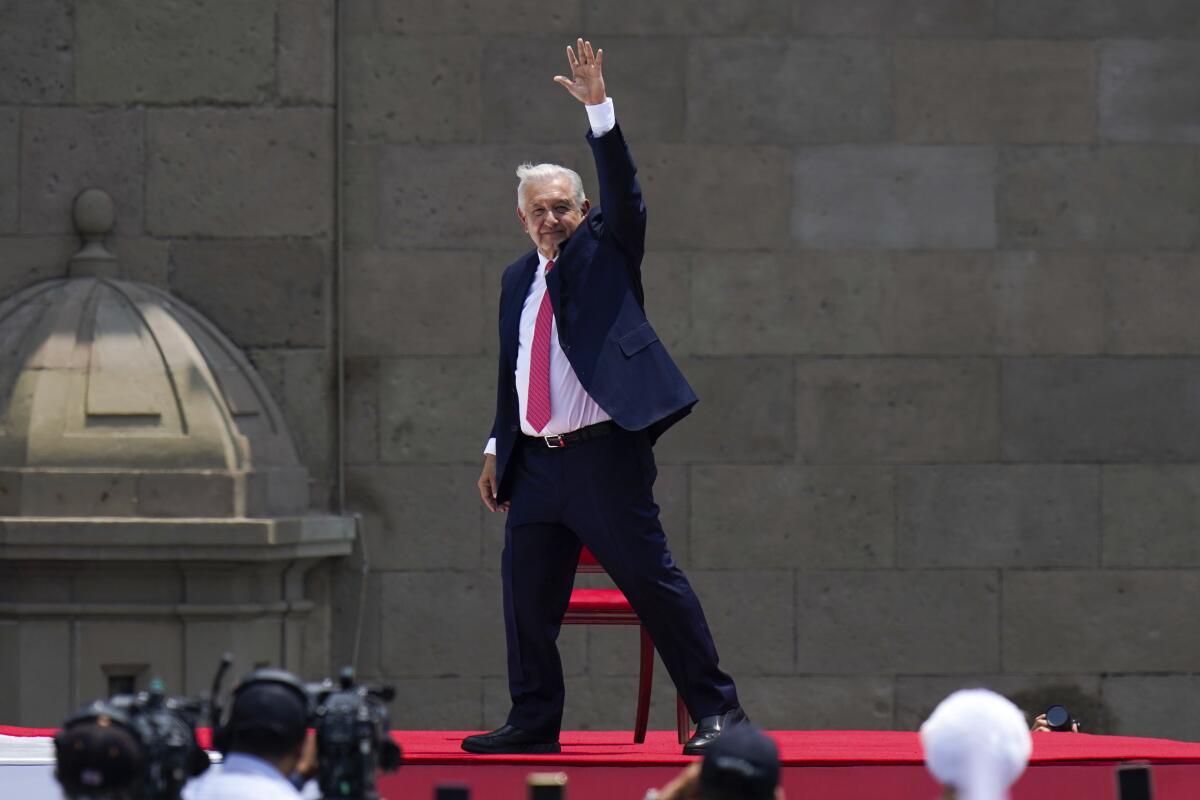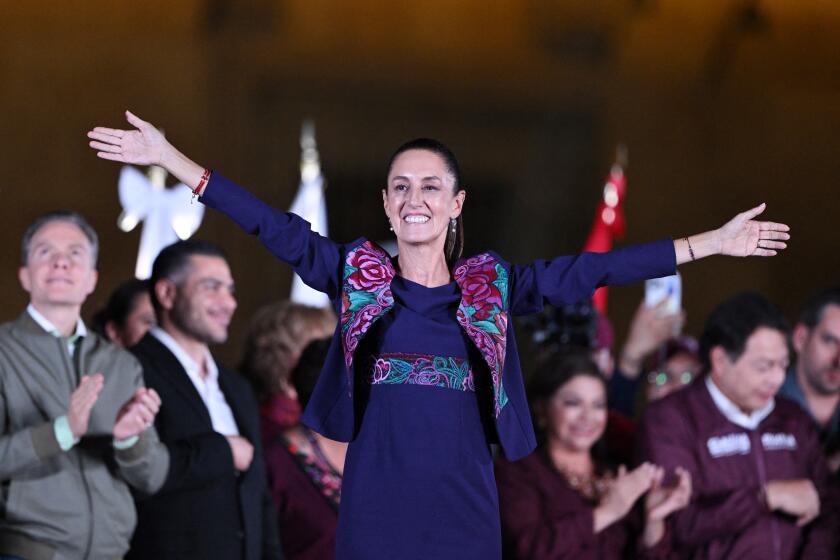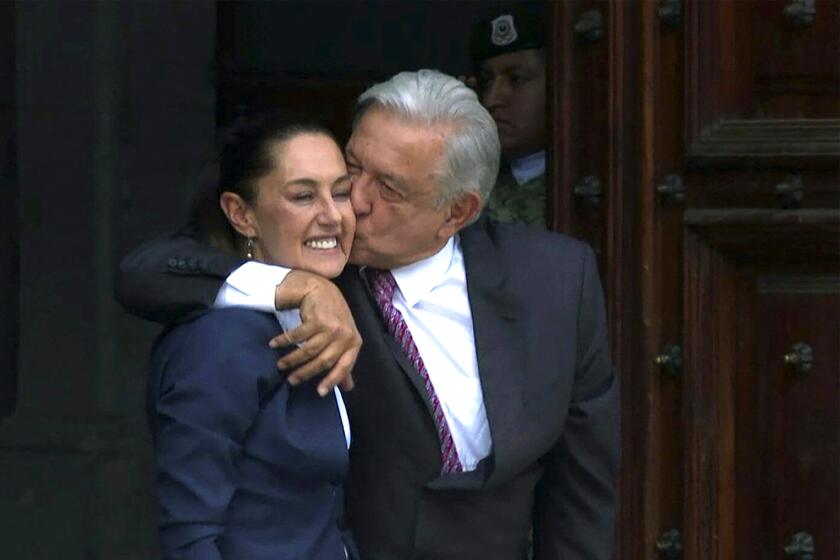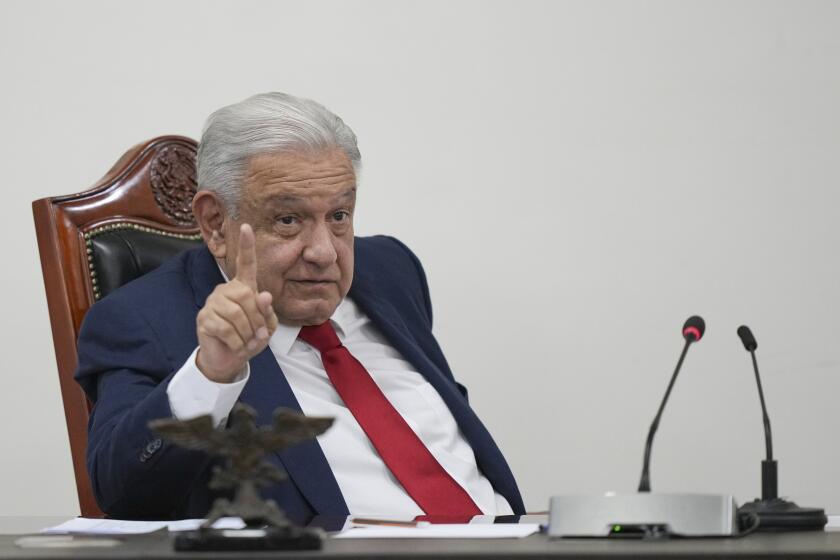Mexico is in turmoil over a radical constitutional change pushed by the president during his last days in office

- Share via
MEXICO CITY — Three weeks from the end of his presidency, Andrés Manuel López Obrador could be taking victory laps.
The leftist leader of Mexico has slashed poverty and tripled the minimum wage. He boasts an approval rating of 73% — practically unheard of for an outgoing president — and on Oct. 1 will be succeeded by a loyal protege who has vowed to continue his signature policies.
Morena, the political party that López Obrador officially incorporated just a decade ago, now controls both chambers of Congress and a majority of the country’s 32 states.
But instead of basking in his successes, López Obrador has picked a fight.

He’s tipped the country into turmoil by pushing a controversial constitutional change that would dramatically overhaul Mexico’s justice system by making every judge in the country — including members of the Supreme Court — stand for election.
López Obrador’s plan has been slammed by the business community, Mexico’s top trading partners and the nation’s legal professionals, including thousands of judges and other court employees who have been on strike for weeks in protest.
The peso has plunged to its lowest rate against the dollar in nearly two years, and marchers have filled the streets daily, saying the president’s plan would eliminate crucial democratic checks and balances, facilitate corruption and stack the courts with judges loyal to the ruling party.
Mexico’s judges walked off the job following President Andres Manuel López Obrador’s plan to overhaul the judiciary, with judges elected not appointed.
When the lower house of Congress voted to approve the president’s proposal — clearing the way for a vote in the Senate as early as this week — lawmakers were forced to meet inside a sports stadium because the doors to Congress had been blocked by angry demonstrators.
For the president’s longtime critics, the judicial proposal is fresh evidence of López Obrador’s disregard for democratic institutions and his desire to consolidate power.
“We saw this coming a long time ago,” said Carlos Bravo Regidor, a political analyst, citing López Obrador’s attacks on other independent institutions, including a failed effort to gut the National Electoral Institute.
But some of López Obrador’s supporters are raising alarm about his proposal too, warning that it could jeopardize his legacy as a champion of the poor who cut income inequality and connected with the working class like few leaders before him.
Some have questioned why López Obrador is using his final days in office to push a divisive measure that will saddle his successor, Claudia Sheinbaum, with a host of political and economic challenges that didn’t exist when she won election in a landslide just three months ago.
Mexico election: Claudia Sheinbaum will be Mexico’s first female president, shattering gender barriers in a country with high rates of violence against women.
“The president is hobbling her entry into government — she’s going to start her term with a serious political problem,” said Carlos Pérez Ricart, a professor of international relations at the Center for Research and Teaching in Economics. If the reform passes, Sheinbaum will spend her critical first months in office implementing drastic changes to the judiciary — including organizing nationwide elections — and doing damage control to ease spooked investors, he said.
Pérez has praised other López Obrador policies, but called the president’s push for judicial reform “an outburst of folly” and compared him to other popular leaders globally “who have destroyed their political projects” by stretching the limits of their mandates.
López Obrador, 70, who ran for president and lost twice before he was elected in 2018, has utterly transformed Mexico’s political landscape during his six years in office, turning a grassroots leftist social movement into the nation’s dominant political party. He is prohibited by the constitution from running for a second term.
Will Mexico’s president-elect be AMLO 2.0 or an independent leader? A push for a controversial judicial reform hints at Claudia Sheinbaum’s direction.
Vowing to stamp out pervasive corruption and “put the poor first,” he slashed funding for most government agencies and created a vast system of welfare payments for elderly and young people.
He also gave the armed forces control of a host of civilian functions, from building airports and train lines to operating ports, and hampered the work of independent government institutions, including the National Institute for Transparency, Access to Information and Personal Data Protection, which guarantees public access to information.
Some of his efforts to expand executive power — like a proposal to radically reshape the elections institute — were struck down by courts.
López Obrador harshly criticized the country’s judges, who he alleges are corrupt and serve the interests of the “power mafia” of economic elites that he says controls Mexico. Earlier this year, he proposed dismissing them all — and having future judges elected by popular vote.
“It’s a thirst for power,” Bravo said of López Obrador. “What’s motivating this is sense of revenge against the autonomous institutions that restricted or limited what he wanted to do.”
Andrés Manuel López Obrador says Mexico’s communications with U.S. and Canadian embassies are ‘on pause’ after ambassadors criticized his plan for a judiciary overhaul.
At first, López Obrador didn’t have the support to pass a constitutional change, which requires a two-thirds majority in both houses of Congress and the approval of at least half of the country’s state legislatures.
Then came Morena’s overwhelming victory in the June elections, in which the party won a supermajority in the lower house of Congress and came close to having one in the Senate — putting constitutional changes suddenly within reach.
“This opened up an unexpected window that he’s taking advantage of,” Bravo said.
Under Mexico’s current judicial system, those hoping to become federal judges must undergo training, pass public exams and be evaluated by an oversight council. The president nominates three candidates for each vacancy on the Supreme Court, and the Senate approves one.
Under the new reform, people would need only a law degree and a letter of recommendation from anyone to be eligible for some judgeships. The field of candidates would be winnowed down by a committee before being added to ballots. It’s unclear how many candidates would be allowed to run in any given race.
Meanwhile, the number of judges serving on the Supreme Court would shrink from 11 to nine, and their term would be shortened to 12 years from the current 15.
Critics of the proposed plan warn that elections would turn judges from impartial interpreters of the law into political actors who might issue decisions to win votes or to please campaign donors, even criminal organizations.
An escalating turf war engulfing much of Mexico’s heavily Indigenous Chiapas state has displaced thousands as gangs battle for drug- and gun-trafficking routes.
“It exacerbates the problem of corruption because judges will be catering to special interests,” said Amrit Singh, a professor at Stanford Law School. “In a country like Mexico where organized crime is so, so powerful, that is a particular problem, because there’s a risk that organized crime will be the constituency that is able to capture the judiciary most effectively.”
The changes proposed by López Obrador “feel existential,” Singh said. “It’s a really drastic step that is fundamentally contrary to the rule of law.”
“It would do away with an independent institution that that has stood up to López Obrador’s power grabs time and time again,” she said.
Proponents of the plan point out that some state judges in the United States are elected by popular vote, although federal judges and Supreme Court justices are appointed.
Singh said the U.S. should not be a model, citing studies that show state judges are predisposed to rule in favor of donors to their election campaigns.
Mexico’s judicial system isn’t perfect and could use changes, Singh said. But she said López Obrador’s plan would make the things he decries — cronyism and corruption — much worse. “It’s going to destroy any vestige of justice that’s left in Mexico,” she said.
Academic Oswaldo Zavala has pushed back at the notion that Mexico’s drug cartels are all-powerful, arguing that they could not exist without state support.
“This is populist authoritarianism at work,” Singh said. “These reforms are claimed to be in support and in service of the people, but actually what they’re doing is they’re giving a government carte blanche to do what it wants without any kind of checks and balances.”
López Obrador, however, frames the proposal as part of his bigger quest to make Mexico more equal.
He seems proud that American and Canadian officials and business leaders on both sides of the border oppose the proposal, which they say could endanger investment in Mexico.
“The corrupt judges, ministers, justices ... continue defending foreign companies that come to loot, rob and affect the economy of the Mexican people,” he said.
Polls show that less than half of Mexicans support the judicial overhaul, and that many don’t understand the details of the proposal.
Still, López Obrador has plenty of backers. At his final state of the union address this month, he asked the crowd of thousands of people gathered in Mexico City’s central square to raise their hands if they supported the judicial plan. A sea of arms rose.
Read more coverage of Mexico and the Americas.
More to Read
Sign up for Essential California
The most important California stories and recommendations in your inbox every morning.
You may occasionally receive promotional content from the Los Angeles Times.

















